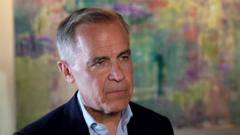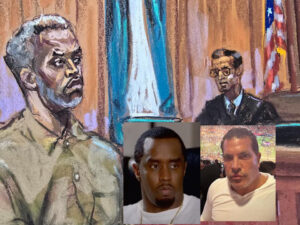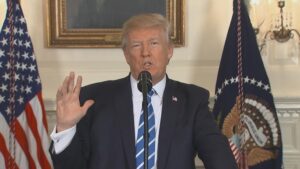Sinn Féin president Mary Lou McDonald and Northern Ireland's first minister Michelle O'Neill will not attend the St. Patrick's Day events at the White House next month, choosing to boycott over U.S. President Donald Trump's remarks regarding the Israel-Gaza conflict. The decision follows heightened calls for clarity from the party concerning its position on the issue, especially after the Social Democratic and Labour Party (SDLP) also indicated they would decline participation if invited.
**Sinn Féin Declares Boycott of White House St. Patrick's Day Festivities in Protest of Trump's Gaza Stance**

**Sinn Féin Declares Boycott of White House St. Patrick's Day Festivities in Protest of Trump's Gaza Stance**
Sinn Féin leaders announce decision to skip annual White House celebrations, citing U.S. President Trump's controversial comments on the Israel-Gaza conflict.
McDonald expressed deep concern over Trump's rhetoric, particularly calling for mass expulsion of Palestinians from Gaza, which she labeled a breach of international law and a major destabilizing force in the Middle East. Despite acknowledging the value of U.S.-Ireland relations and America's role in Ireland's peace processes, McDonald asserted, “The only route to peace and security is a permanent ceasefire followed by a negotiation settlement.”
O'Neill echoed McDonald's sentiments, condemning the notion of forced expulsion and expressing her commitment to advocate for peace and economic growth. She emphasized the historical significance of their stance, stating, "I stood firmly on the side of humanity."
Political engagements around St. Patrick's Day have always been significant for Irish leaders, culminating in symbolic gestures such as the presentation of a shamrock bowl to the U.S. president. In light of recent developments, both Sinn Féin and the SDLP have taken a decisive stand against the current U.S. administration's policies. The fallout from these political decisions signals a burgeoning shift in the relationship between Irish parties and U.S. leadership, as they navigate the complex dynamics surrounding the ongoing Israeli-Palestinian conflict. The approaching St. Patrick's Day celebrations will now serve as a platform for Irish leaders to voice support for international law and Palestinian rights against a backdrop of controversial U.S. political discourse.
O'Neill echoed McDonald's sentiments, condemning the notion of forced expulsion and expressing her commitment to advocate for peace and economic growth. She emphasized the historical significance of their stance, stating, "I stood firmly on the side of humanity."
Political engagements around St. Patrick's Day have always been significant for Irish leaders, culminating in symbolic gestures such as the presentation of a shamrock bowl to the U.S. president. In light of recent developments, both Sinn Féin and the SDLP have taken a decisive stand against the current U.S. administration's policies. The fallout from these political decisions signals a burgeoning shift in the relationship between Irish parties and U.S. leadership, as they navigate the complex dynamics surrounding the ongoing Israeli-Palestinian conflict. The approaching St. Patrick's Day celebrations will now serve as a platform for Irish leaders to voice support for international law and Palestinian rights against a backdrop of controversial U.S. political discourse.





















